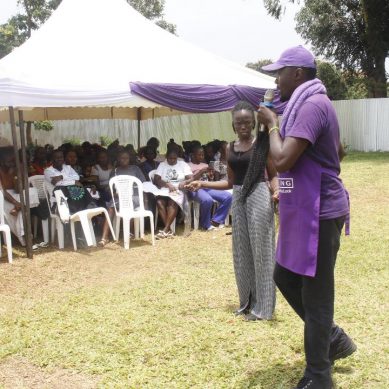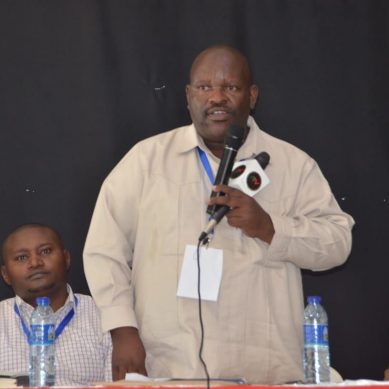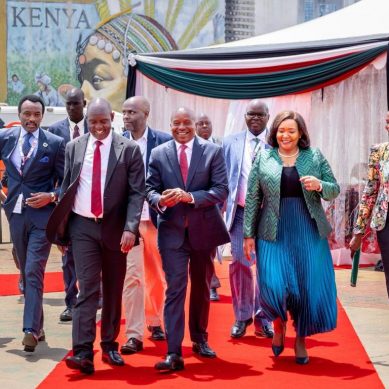
After months of deepening insecurity and political turmoil, Haitians have experienced some respite in the past few weeks as a new transitional government has formed and a Kenya-led stabilisation force has started to deploy. But many are fearful it is just a temporary lull, and that further troubles lie ahead.
In the capital, Port-au-Prince, and neighbouring districts paralysed by gang violence since a major escalation in February, Haitians have been cautiously resuming some of their commercial and other daily activities, although attacks persist in some areas.
Many Haitians regarded the interim leadership since the July 2021 assassination of President Jovenel Moïse as corrupt and lacking legitimacy, but the formation of a new transitional government – designed to pave the way for Haiti’s first elections since 2016 – has helped restore some sense of normalcy.
“This brings hope,” said Johnny Etienne, a Haitian who works as director of communications for Save the Children in Haiti. “The troops arrived, and with the appointment of the prime minister and a new cabinet, there is a feeling that there is some governance. People tend to go out more in the streets, although there still are many locations where the violence continues.”
Several hundred Kenyan police officers landed in Port-au-Prince on June 25, four months after gangs joined forces in a coalition called Viv Ansanm (Live Together) on February 29, starting a rebellion that plunged the country into violent chaos and forcing acting prime minister Ariel Henry to flee, then resign.
After weeks of lawless limbo, Henry was replaced by a transitional presidential council. In early June, it appointed former regional director for UNICEF Garry Conille as interim prime minister and a new transitional government was installed and will remain in place until elections, expected by February 2026 at the latest.
“We are on the brink of a new beginning,” Conille told the media on June 26, as he visited the base of the UN-approved Multinational Security Support (MSS) mission after the first contingent arrived. “I urge the Haitian population to remain vigilant, confident and patient,” he said, adding: “We will reclaim control of the country.”
Gangs, who control more than 80 per cent of the capital and large parts of the neighbouring Ouest and Artibonite departments, have long existed in Haiti, but have tightened their grip on the country since Moïse’s assassination. They joined forces in February – while Henry was out of the country trying to shore up the Kenya-led MSS mission – to launch coordinated attacks on key infrastructure: prisons, police stations, the international airport and the main seaport terminal. The pressure culminated in Henry’s resignation in April and the introduction of the transitional presidential council.
But the fallout on Haiti’s population of 11.5 million has continued. The gangs use looting, rape, kidnappings and killings as a way to assert their power, disrupting daily life and depriving people of their sources of livelihood. According to the UN, nearly 580,000 people have been displaced due to gang violence, and 3,252 homicides were registered from January to May 2024. Nearly one in two Haitians now faces acute food insecurity.
Rosy Auguste Ducéna, programme manager for the National Network for the Defence of Human Rights (RNDDH), said the new political leadership had seen the security situation slightly improve in the Ouest and Artibonite departments. Some schools that had sheltered victims of the violence have been able to reopen for classes, she said, while economic activity was picking up again, along with public transportation.
“This impression of a normalisation of the situation is simply due to the fact that armed bandits don’t have allies among the new authorities,” said Auguste Ducéna. “But these authorities haven’t taken any measures to restore security so far.”
Others opined that the lull started even before Conille was appointed. Emmanuel Paul, a security consultant and adviser to humanitarian organisations who used to work in Haiti’s Defence Ministry, attributed it to the fact that “armed groups were on the watch to see what the new prime minister would do”.
“They know he is a technocrat with no sulphurous political past,” he added.
The World Food Programme (WFP) also noted several improvements in recent weeks: they’ve been able to operate with more ease; they’ve increased the presence of WFP personnel for registration and post-distribution monitoring; they’ve re-established their humanitarian passenger and cargo services to the airport after months of restricted access; thanks to safer roads, financial service providers have also been able transport cash transfers to beneficiaries, providing some relief to cash liquidity challenges.
“Over a two-week period in May, 615 metric tonnes of rice, beans, and vegetable oil were distributed to nearly 93,000 people in Cité Soleil (one of the poorest and more violence-stricken areas of the capital), including breastfeeding mothers and children who had been cut off from humanitarian assistance,” Tanya Birkbeck, head of communications for WFP in Haiti, said.
Dozens of hospitals and health centres that were forced to close haven’t reopened, mostly due to a shortage of medicines, according to Médecins Sans Frontières. A recent article by Haitian news outlet Le Nouvelliste reported that northern Port-au-Prince “resembles a region freshly struck by a major earthquake”, and that “everything that symbolised the presence of the state has been destroyed”.
And many Haitians remain very worried about the security situation, especially considering the lack of information surrounding the international stabilisation mission and constant reminders that this relative pause in the violence is extremely fragile.
On 30 June, a gang attacked a police station and set several houses on fire in the commune of Gressier, on the outskirts of the capital, reportedly killing at least 20 residents and threatening the surrounding Palmes region. The Haitian police were eventually able to stop them, but many took it as a sign that hostilities are resuming. Three days earlier, the gang 400 Mawozo torched the townhall of Croix-des-Bouquets, a commune of the Ouest department long controlled by armed groups.
So far, little has been said about the role the MSS force will be playing on the ground. On 1 July, the Kenyan police issued a statement saying that, since their arrival, officers “have been working closely” with the PNH. “[They] have so far undertaken strategic mapping of the key areas of operational concerns and conducted several joint patrols within Port-au-Prince,” the statement read.
- The New Humanitarian report






